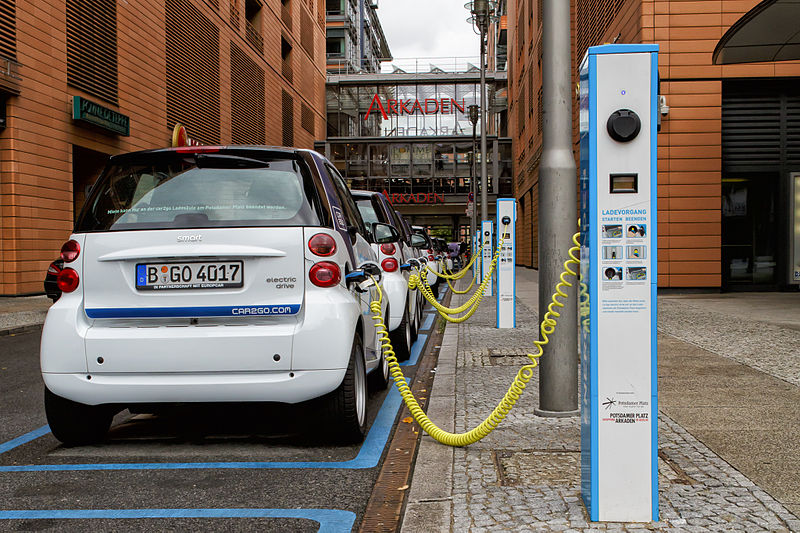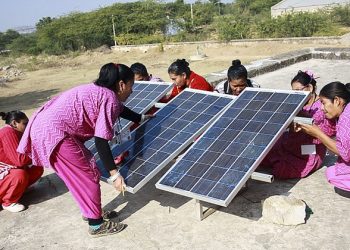As the world continues to grapple with the COVID-19 crisis and its enormous economic and social impacts, Germany has pointed the way towards building back better in a way that emphasizes environmental as well as economic concerns. Its €130 billion ($146 billion) domestic stimulus is not just aimed at economic recovery, but at paving the way towards a more sustainable, inclusive and job-rich future economy.
Because the country is the EU’s political and economic powerhouse, this matters far beyond its borders. Germany’s actions can build momentum for the European Commission’s own recently proposed €750 billion EU-wide stimulus package (25% of which is for climate-friendly stimulus), along with the ambitious Green Deal framework that frames the EU’s transition to a low-carbon economy.
As with other stimulus packages, the primary aim is to repair the vast amount of economic damage caused by the COVID-19 crisis and get Germans back to work. Germany’s economy is expected to shrink by 6% over the course of 2020. Millions are now unemployed or facing uncertainty over their jobs. But as well as this immediate aim, the German stimulus package is focused on a recovery that cultivates jobs and growth in low-carbon and sustainable sectors. As with the EU Green Deal, this follows a recognition that future economic competitiveness will come from new technologies and business models in these sectors.
Germany Puts Forward a Sustainable Economic Vision
Germany’s recent environmental record has been less than inspiring. For instance its energy policy has come under fire, and, thanks to sensitivities about jobs in coal-producing parts of the country, Germany only committed to phase out coal power by 2038. That timeline has justifiably been criticized as unambitious and incompatible with the Paris Agreement. And the German government has historically maintained close links to manufacturing — especially the country’s powerful car industry, which some say slowed progress on electric vehicles (EVs).
Chancellor Angela Merkel’s stimulus package now brings forward some important measures that can significantly improve the country’s environmental record and accelerate the shift towards a low-carbon economy. The core of this is a €50 billion future investment package, aimed not just at reducing the country’s carbon footprint, but also at promoting research and development (R&D) in key low-carbon industries.
The EV sector features prominently, which is important since Germany lags far behind EV pioneers like Norway, the Netherlands and Sweden in EV ownership rates. There will be grants for EV purchases and an investment program for e-mobility manufacturers. Critical infrastructure such as e-charging facilities will be upgraded, and money invested in railways and electric-powered buses and trucks. Finance will also flow towards R&D in low-carbon shipping and aviation. Altogether, this part of the package is worth €15 billion.
The inclusion of these elements, and the fact that there are no mechanisms for support for the traditional car industry, reflects what must have been a strong line by the German government in resisting the car industry lobby. By contrast, after the 2008-09 financial crisis, the car industry lobbied heavily for a car-scrappage scheme without additional efficiency requirements for new cars, resulting in a rise in emissions.
The package puts €7 billion towards Germany’s national Hydrogen Strategy and €2 billion to fund efficient hydrogen projects in other countries. The aim here is to make Germany a key player in the emerging hydrogen power industry, which may become an essential tool in decarbonizing heavy industries like cement and steel. This would support Germany’s transition away from coal, with money targeted at industrial-scale projects and energy supply. It is a very encouraging sign that R&D money is being invested in promising new technologies, just as investments went into renewable energy after the last financial crisis. The €2 billion for energy-efficient building refurbishments are important, as retrofitting and other measures have been shown to be a rich source of local jobs as well as environmental benefits. For example, a new IEA report estimated that building efficiency retrofits can generate more than double the amount of jobs as the fossil fuel industry for the same investment.
R&D in other green and digital projects (€2.5 billion) are also part of the package. A surcharge for renewable energy on domestic power bills will be capped.
These measures aimed at forging new low-carbon industrial sectors, along with digitalization, are particularly noteworthy. The recognition that economies need to shift in this direction — and the acknowledgement that this will entail large-scale changes to the structure of the German and wider EU economies — already underpins the EU’s Green Deal plans. The European Commission sees this as the route for Europe to remain globally competitive through the 21st century, as well as lower GHG emissions and create a less resource-intensive circular economy.
The rest of the package deals with consumption, support for companies badly affected by the COVID-19 crisis, health, artificial intelligence research, public spending and supporting international partners (especially within the EU). The importance of development and humanitarian aid is also emphasized.
Where Does Germany’s Stimulus Fall Short?
Despite the broad welcome for the green components in the proposal, there have been some dissenting voices. Critics argue that the government has interpreted the stimulus and climate protection piecemeal, through an industry- and sector-specific lens. Instead, they argue that jobs and growth can be achieved while supporting broader climate commitments more systematically. This is important, because some charge that Germany’s Climate Action Programme 2030 is inadequate and lacks ambition. Germany’s National Energy and Climate Plan, which it has also just submitted, has been criticized for the lack of ambition in its main GHG target. The current proposals also lack any mention of agriculture or food, although the EU recently unveiled its own farming and biodiversity strategies.
Despite these criticisms, it’s clear that Germany’s recovery package has a very strong environmental element and that it will also deliver on jobs and growth. Other countries around the world can learn from this. The emphasis on R&D underscores that environmentally friendly technologies are at the heart of a strong future economy, rather than a drag on growth, wealth and livelihoods. It is also much more specific about where money will be spent, compared to other, more general national plans. This is encouraging, as transparency leads to accountability.
Will Germany’s Stimulus Plan Encourage Others to Build Back Better?
Germany is Europe’s economic and political heavyweight. Its wealth is accompanied by enormous influence, buttressed by the country’s 6-month presidency of the EU in the second half of 2030 and an active role in the G7 and G20. This can be critical in leading and creating momentum for a job-rich economic recovery and a low-carbon future within the often-unwieldy 27-member European Union and beyond. It has also informed Germany’s approach to development aid, with Development Minister Gerd Müller calling for a low-carbon “Green Deal” for Africa.
The ultimate question regarding this recovery package is how much it will shape measures taken by individual EU countries such as France, and at the EU level. Certainly, other European countries with weaker economies will struggle to find the money to rebuild with Germany’s level of ambition.
Despite missing the opportunity to align measures with broader climate commitments, Germany is sending a welcome signal that developing a low-carbon economy is critical for the health of national economies as well as the planet. As the EU begins to wrangle over the details and costs of the Commission’s own recovery proposals and the broader Green Deal, this signal and the momentum it builds may prove critical. With Chancellor Merkel’s package, Germany is showing that it can play the role of an environmental as well as an economic and political leader on the international stage.



